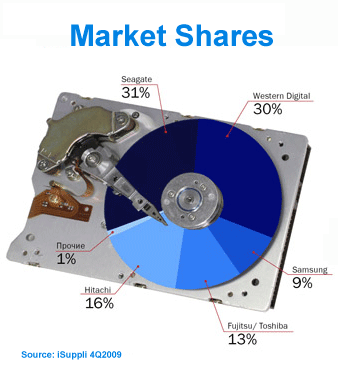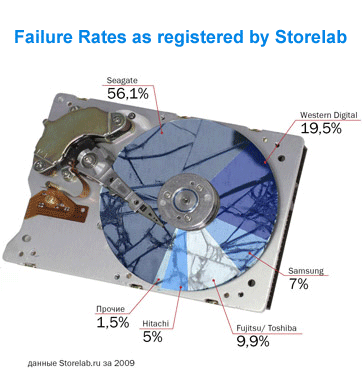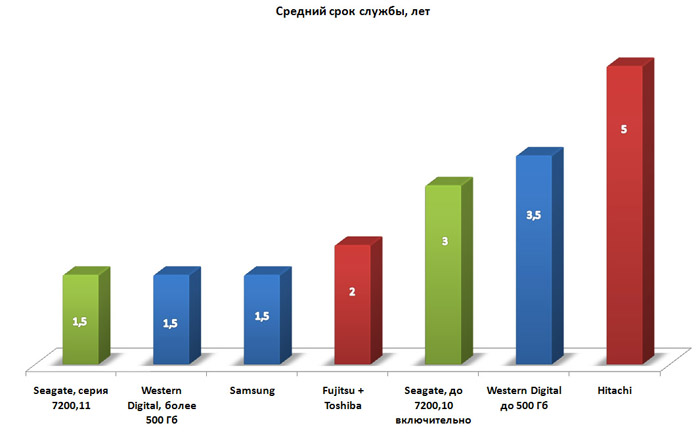Study: A Look At Hard Drive Reliability In Russia
Storelab, a Russian player in data recovery, recently released a long-term study comparing hard drives from a number of different vendors. The controversial report offers interesting data and provides a snapshot of HDD reliability and defect reasons.
The Durability Standard
The Durability Standard
The majority of all hard drives sold worldwide are produced by just six manufacturers: Fujitsu/Toshiba, Hitachi, Samsung, Seagate, and Western Digital. In order to determine which of these vendors sell the most durable products, Storelab evaluates the hard drives they receive for recovery, as well as the economical losses failures cause customers. In this particular study, more than 4000 2.5" and 3.5" hard drives are included. Storelab also compares the number of defective drives received by different manufacturers with their respective market shares. One has to keep in mind that failure rates will appear higher for popular manufacturers. A substantial difference between market share and the proportion of failed drives can indicate higher or lower product durability.
At this point, we also need to make very clear that the study is not representative and cannot be seen as a comprehensive reliability summary. It reflects only a very tiny fraction of the hard drive market. Drives are taken from analysis made during the recovery process, and there aren't specific test groups. It covers different form factors and different product lines, etc. Think of this analysis as an overview on reliability that might apply to the hard drives in your home city. Results very likely differ somewhere else.
Based on the graphs, we see that failures and market shares only partially correlate. The largest percentage difference can be seen with the market leader, Seagate, where its failure rate of over 56% is almost twice as high as its 31% market share. Even though Seagate reports a 40% market share within the Russian market, from which Storelab pulls its data set, the difference is still very noticeable. The other five manufacturers show proportional failure rates below their market shares. In particular, Hitachi and Western Digital are almost 11% lower, at least suggesting higher durability and reliability. Again, this only applies to this limited sets of drives in this specific environment.
The second key durability indicator is the average age of hard drives at their time of failure. Again, we see large differences between the various manufacturers, as well as between specific models. A hard drive's future durability is difficult to predict during development. Engineers cannot do much more than perform laboratory tests and simulate the effects of temperature, pressure, vibration, etc. These setups are never capable of identifying all possible design flaws, especially since the tests cannot be run for the full time periods the drives are designed to operate. Instead, a failure-free test period of around one and a half years is considered a good enough yardstick for the durability of the hard drive's design and construction.
As you can see from the Storelab-provided table (complete with Russian titles), Hitachi wins in terms of long-term reliability for 500 GB models. These drives operated for an average of five years, at least half a year longer than those of Western Digital. The values for Seagate's 7200.10- and 7200.11-series were separated to give a more fair representation. Keep in mind that a new product line can potentially turn the results upside down. We're looking at a snapshot of the hard drive market last year.
Get Tom's Hardware's best news and in-depth reviews, straight to your inbox.
Current page: The Durability Standard
Prev Page Practical Relevance Next Page Typical Failures And Data Losses
Igor Wallossek wrote a wide variety of hardware articles for Tom's Hardware, with a strong focus on technical analysis and in-depth reviews. His contributions have spanned a broad spectrum of PC components, including GPUs, CPUs, workstations, and PC builds. His insightful articles provide readers with detailed knowledge to make informed decisions in the ever-evolving tech landscape
-
cmcghee358 Why post this study if, at every opportunity, you tell us that the data is so limited we aren't to use it as guidance on the quality of the listed drives?Reply
Seems a waste of time. -
mitch074 @cmcghee358: because if they didn't put it at least once per page, polemics could be started by any website linking to one page without it said "THG says Seagate drives are crap!".Reply
Which is true, but only according to a limited, but still relevant (and one of the few available) study.
But, it correlates pretty well to what I experienced: the only failed Hitachi drives I got (and I got a bunch of them) were due to:
- manufacturing fault (and RMA worked well and fast) creating faulty sectors,
- old age (10 years) creating faulty sectors.
Never once, in the two dozen Hitachi (and IBM) drives I had to manage, was a failure related to hardware fault - even dropping a (not running) 2001 drive from one meter height on solid concrete failed to damage it.
I tried Maxtor, Toshiba, and WD drives, and most of these eventually developed unrecoverable hardware faults leading to massive data losses; Hitachi drives caused, at worst, a few files to be lost due to irrecoverable sectors (many times, I got SMART warnings before the data became impossible to rebuild).
I got some Samsung drives recently; they're cheap, and they added shock resistance capabilities in the 2.5" versions, I'll see if they do better than the Hitachi ones (I do backups on Hitachi drives still). If this report is any indication, Samsung notebook drives in RAID 1 array for a desktop machine should allow for reliable operation - the one I have carried around for 2 years in my fanny pack seems sturdy enough, too. -
jj463rd Oddly enough I had to get rid of some old relics (I.B.M. XT's) from the mid 1980's last year.All 5 of them had hard drives which still worked and the machines were still fully functional.Sad I would have liked to have kept them but there was too much clutter in my house.Reply -
jsowoc I'm not sure if my comment is valid, but because Seagate has a lot of market share, its drives are considered "reliable" by many. If I paid a premium for the drive, it's because I have (had?) valuable data on it, and am willing to pay for data recovery.Reply
Could this be part of the reason why Seagate has more than its fair share of drives sent in? -
obrut I have replaced all my Seagate drives with WDs during the last year. My personal study for the last 20 years show that throughout this period only the WD drives show long enough lifespan and reliability. Recently (last 2-3 years) Seagate took quality out of the equation. Currently they are only interested in market share and not the fair name their own brand.Reply
Again, this is personal study - for example I have used only one Hitachi drive during this period, so I can't make statistics on the base of one. -
liquidsnake718 Well I live in the Philippines and im not happy to say that almost 2 years ago I bought a WD Passport and it died on me after 3 months. WD or the retailor replaced it for me via the local distributor. However I lost all of my data that was backed up because prior to that my significantly older Seagate serial IDE 80gb with THAT very same data died on me!Reply
Yeah WD gave me a slightly upgraded HD with 40 more GB but all that info and files that were lost was irreplacable. The problem, was a faulty pin, or the reader that looks like a raptors nail! The device would just click and click and my HDD wouldnt read. -
I'm not sure why but I don't like Seagate too :) Most of my hard drives are Hitachi and I've got 2 failures - one after a power surge and another which was some bad sectors, but the drive was 60GB and it was around 3 years old. I have one Seagate drive and it works fine, I've been using it for around 3 years now on a storage server.Reply
I know a lot of people who had problems with that particular "CC Fly", maybe that is why I don't like Seagate. Nowadays I'm turning to WD, I really want to see how are they doing.
Btw I have 3-4 40GB Maxtors that are still very much alive and working for about 9 years now :) -
dragonsqrrl I remember reading about some problems with the Seagate 7200.11 series, along with a lot of bad ratings on Newegg.Reply -
Azriel4444 The Seagate 7200.11 series was horrible. I avoid them no matter how cheap they are on sale. 7200.12 are way more dependable.Reply


